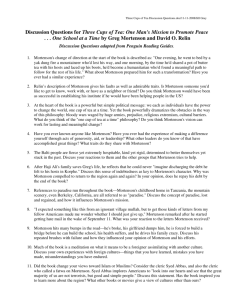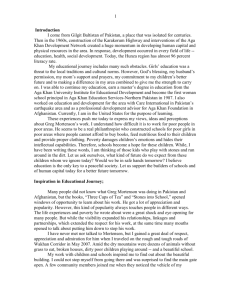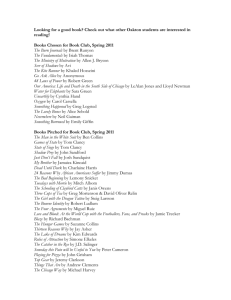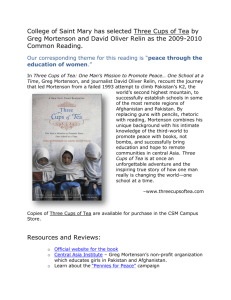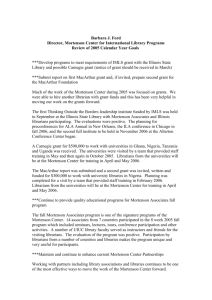Lesson 8
advertisement
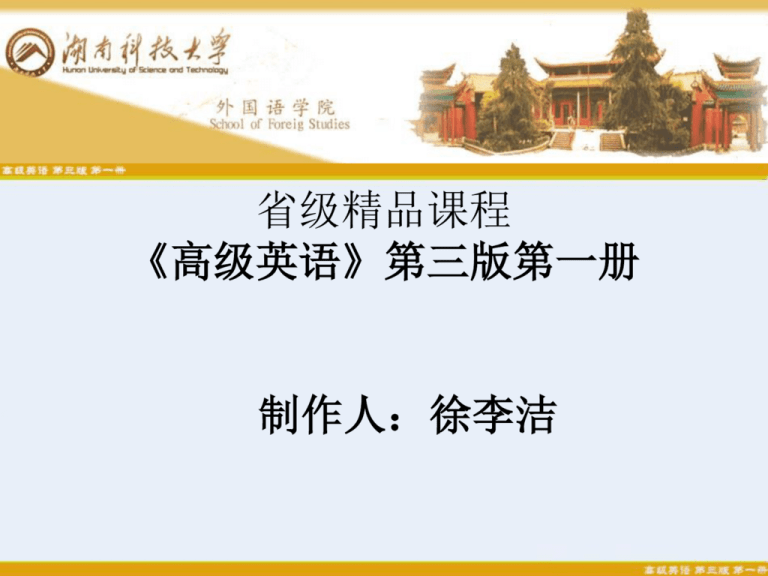
省级精品课程 《高级英语》第三版第一册 制作人:徐李洁 Lesson 8 Three Cups of Tea(Excerpts) Greg Mortenson and David O. Relin Teaching Objectives of Lesson 8 • Familiarize students with social, economic, religious background of Pakistan; • Acquaint students with knowledge of local customs; • Enable students to learn idiomatic expressions in the text; • Familiarize students with vocabulary concerning construction. Greg Mortenson • Born on Dec. 27, 1957 • an American humanitarian, professional speaker, writer, former mountaineer and a military veteran. • co-founder and Executive Director of the non-profit Central Asia Institute ( whose mission is to promote and support community-based education, esp. for girls, in remote regions of northern Pakistan and Afghanistan) • founder of the educational charity Pennies for Peace. Books •co-author of Three Cups of Tea: One Man’s Mission to Promote Peace…One School at a Time • author of Stones into Schools: Promoting Peace with Books, Not Bombs, in Afghanistan and Pakistan. •More than ten years, Mortenson has faced one and another impossibilities , and then make them possible. Greg Mortenson with children Greg Mortenson’s Awards (1) • • • • • • • • • • • • • • • • • 2004 Al Neuharth Free Spirit of the Year Award for building schools for Pakistan girls. 2008 Citizen Center for Diplomacy National Award for Citizen Diplomacy 2008 Courage of Conscience Award 2008 Graven Award - Wartburg College, IA 2008 National Award for Citizen Diplomacy - Citizen Center for Diplomacy 2008 Mary Lockwood Founders Medal For Education - Daughters of The American Revolution 2008 Sword of Loyola, St. Louis University, MO 2008 Charles Eliot Educator Award - New England Association of Schools & Colleges 2009 Academy of Achievement Award 2009 Sitara-e-Pakistan (The Star of Pakistan medal) 2009 Archon Award - Sigma Theta Tau International (Nursing Award) 2009 Austin College Leadership Award, Sherman TX - life work to take courageous stand on education issues for peace 2009 National Education Association (NEA) Human & Civil Rights Award 2009 City College San Francisco Amicus Collegii Award - Promoting peace through education 2009 Jefferson Award For Community Service: Carnegie Endowment & Harvard Kennedy School of Government 2009 U.S. News & World Report: America's Top 20 Best Leaders 2009 2009 Italy: Premio Gambrinus “Giuseppe Mazzotti” Greg Mortenson’s Awards (2) • • • • • • • • • • • • • • • 2010 Loyola Marymount University (CA) - Doshi Bridgebuilder Of Peace Award 2010 The Common Wealth Awards: For Public Service 2010 The Salem Award for Human Rights 2010 The Christopher Award: "To affirm the highest values of the human spirit" 2010 The 10th annual Lantern Award “Excellence in Education Innovation” (MOSTE – LA, CA) 2010 Distinguished Service To Education Award: National Elementary School Principals Association 2010 Creativity Foundation & Smithsonian Institution: Benjamin Franklin Laureate Award For Public Service 2010 Literature To Life Award - American Theater Place 2010 Viking Award - Norway House for pursuit of hard, bold, dangerous and important undertakings 2010 Freedom Award - Freedom Festival for extraordinary devotion to the cause of liberty at home and abroad 2010 American Peace Award - representing the spirit of world peace through thoughts and actions 2010 The Mason Award - Extraordinary contribution in literature (George Mason University DC) 2011 Gelett Burgess Children's Book Award Three Cups of Tea Young Reader's Edition 2011 Presidential Award for Leadership in Social Change - Walden University 2011 Raoul Wallenberg Award for humanitarian endeavors - Old Dominion Univ., VA Background of the Books • The title of my book Three Cups of Tea comes from a Pakistani proverb that says when you share the first cup of tea you’re a stranger, with the second cup you are a friend, and with the third cup you become family. I picked the title in honor of Haji Ali, the Pakistani village chief who told me we would need three cups of tea if we wanted to accomplish things together. • In 1993, after a failed attempt to climb K2, I became separated from the group as we descended. After walking 58 miles, I wandered into a little village called Korphe. There I me Haji Ali, a stout, elderly man with a silver beard. I hadn’t taken a bath in 84 days, and my pants were ripped. He said, “Welcome to our village, but you do need to wash up a little, son, before you come to my house for tea.” • I stayed with Haji Ali that night and returned later to spend more time in Korphe. One day Haji Ali took me behind the village, where 82 children were sitting in the dirt – 4 girls, 78 boys – and most of the kids were writing with sticks in the dirt. This was their school. A young girl came up to me and said, “Would you help us build a school?” I said, “I promise I’ll build a school for you.” Little did I know that promise would change my life forever. Preface of Chapter 12 • • • It may seem absurd to believe that a “primitive” culture in Himalayas has anything to teach our industrialized society. But our search for a future that works keeps spiraling back to an ancient connection between ourselves and the earth, an interconnectedness that ancient cultures have never abandoned. --Helena Norberg-Hodge (Note.3) Helena is an analyst of the impact of the global economy on cultures and agriculture worldwide, a pioneer of the localization movement. She is the founder and director of the International Society for Ecology and Culture (ISEC) whose mission is to examine the root causes of our social and environmental crisis, while promoting more sustainable and equitable patterns of living. The preface means: Humans’ ultimate goal in seeking expansion and development is probably peace of mind, joy and pace of ease, all of which can be found in a primitive culture. People in modern times have relentlessly endeavored to bring about technical advances in hope of achieving these values that have already been personified and internalized by the people who live in such a “primitive culture” since the ancient times. Main Idea of Paras. 1-22 • Paras. 1-8 These paragraphs give an idea of Mortenson’s disappointment at seeing the little progress in the school construction and of what explanation Haji Ali offers for the sluggishness. • Paras. 9-22 These paragraphs suggest a change in Mortenson’s life makes him anxious to get the construction accomplished Detailed Analysis of Paras. 1-22 Questions: • What had Mortenson done the previous winter about the building of the school? The previous winter, Mortenson had marked out a floor plan of five rooms for school. And he had left enough cash to Haji Ali to hire laborers to get the stone for the construction. (p.2) • Why did Mortenson want to get the school finished as soon as possible? Because he wanted to find himself a career to support his family since he was married. (p.3) • How did Haji Ali explain the slow progress of the construction? Haji Ali did not hire men of Munjung and Askole who were lazy and would work little and arguing much. Instead he had their own villagers cut the stones all summer. (p.6) • What do we know about the Pakistani traditions of marriage? According to Pakistani tradition, a Pakistani bridegroom had to give goats and rams to the bride’s father and the bride should cry when she left her mother. (p.22) Paraphrasing (Para.1) The rocks looked more like an ancient ruin than the building blocks of a new school. Antithesis, contrasting ancient ruins with new school, indicating that there had been little progress in the school construction sine Mortenson last left. (para.4) You look like the young ram at the time of butting. Simile. Haji Ali compared him to a young ram (a male sheep) that was striking with his horns angrily. (para. 6) …because many of the men had to leave for porter work. Korphe is located in northern Pakistan where there are many world-famous high mountains which are the destinations for climbers. Climbers usually hire local men as porters to carry their baggage, supplies and other loads. (para.8) what is one winter more?” What does it matter if we have to go without a school for another winter? Ali knew patience was a essential as hard work. • (para.9) … a bubble of happiness rose up so forcefully that he couldn’t keep it to himself: Metaphor, a vivid way of saying that he felt so happy that he felt he must share his happiness with his friend. • (para.14)…Mortenson felt a sharp flurry of fists pummeling his arms and shoulders in congratulations. Twaha congratulated Mortenson by hitting his arms and shoulders suddenly and repeatedly. • flurry: an occasion when there is suddenly a lot of activity within a short period of time • Pummel: to hit someone or something many times with your fists 1) 电影明星到达时,人群中发生了一阵骚动。 译文:1) A flurry of excitement went round the crowd as the film star arrived. 2)一阵疾风吹翻了小船。 译文: 2)A flurry of wind upset the small boat. Main Idea of Paras. 23-37 These paragraphs present details about the school construction. The involvement in the construction enables Mortenson to have a better understanding of the local culture and their spiritual life Detailed Analysis of Paras. 23-37 Questions • Did the Balti have a written language? How did they know their history without a written language? Balti did not have a written language. People passed down an oral history which was strict, demanding great care, patience and effort. • What did the villagers do before starting to build the school? The villagers would go to the mosque where their religious leader would pray, asking Allah’s blessing and guidance. • What ceremony did the villagers do with the chogo rabak before the construction began? They used the ram as a sacrifice. Every resident of Korphe got a share of the meat. At night, as the moon rose, men danced around the fire, sang songs and women stood at the edge of the firelight, singing and clapping. • What did Mortenson think about different religions? Mortenson was amazed at how much the different faiths had in common and how one could trace their separate traditions to the same root. (p.32) Paraphrasing (para. 24) A grin smoldered, then ignited at the center of his thick beard. Metaphor, comparing a grin to a spark of fire. The man tried to suppress a grin but then his face broke into a broad smile through his thick beard. smolder: to burn or smoke without flame. ignite: to start burning or to make sth. start burning. (para. 26) The Balti, lacking a written language, compensated by passing down exacting oral history. The Balti people lacked a written language. However, this was made up by passing down an oral history which was strict, demanding great care, patience and effort. exacting: adj. severe and unremitting in making demands; exactingly, exactingness I have so trained myself in secretarial work that only exacting problems are interesting to me. 译文: 毫不夸张的说,我在文秘方面受过严密的训练,越是难度大的工作越能 激起我的工作热情。 2) Work was so exacting that by the end of the day he was worn out. 译文:他的工作十分吃力,到一天过完的时候他已经精疲力竭了。 (para. 26) It had stood for nearly five hundred years, and had served as a Buddhist temple before Islam had established a foothold in Baltistan. Balstistan came under the control of the Tibetan King Songtsen Campo in the 7th century. Under Tibetan cultural influence, the Balsti began to adopt Tibetan Buddhism from Indian Buddhism. The history of Islam in Baltistan starts with the arrival of Ameer Kabeer Syed Ali Hamadani ( a legendary Sufi Saint in Muslim History) from Iran during the 15th century. foothold: a place providing support for the foot in standing or climbing; an initial accomplishment that opens the way for further developments; 1) 也许要经过若干年这家新公司才能在市场上取得稳固的立足点。 译文:1)It may be many years before the new company can gain a secure foothold in the market. 2)该字在这种语言中已获得一个稳固的立足点。 译文:2)The word has obtained a firm foothold in the language. (para. 27) During his visits he had kept a respectful distance from the mosque… Mortenson kept a distance from the mosque, not out of disbelief but out of respect. (para. 28) Sher Takhi, who called Korphe’s widely dispersed faithful to prayer five times a day without the benefit of amplification, filled the small room with his booming voice. Sher Takhi had a booming voice, and without the advantage of amplification it filled the small room. He called Korphe’s believers, who were widely scattered working on their respective jobs, to pray five times a day. disperse: to break up and scatter in all directions. Gently, he turned the animal’s head toward Mecca as Sher Takhi chanted the story of Allah asking Abraham to sacrifice his son, • Mecca: the birthplace of Mohammed and the holiest city of Islam. • Abraham: in the Old Testament, the founder and first patriarch of the Hebrew people. He had two sons: Ishmael and Isaac. God Jehovah and Abraham made a covenant, according to which Jehovah promised that he would be God to Abraham and his children and that they would inherit and dwell in the land of Canaan. Jehovah tested Abraham’s loyalty by commanding him to sacrifice Isaac. Abraham was preparing to obey but was stopped at the final moment by an angel and commended by Jehovah, who confirmed the terms of the covenant. (Para. 32) before allowing him to substitute a ram after he passed his test of loyalty. First, Allah asked Abraham to offer his son as sacrifice, but as Abraham was about to obey Allah’s will, thus passing his loyalty test, Allah changed his mind and allowed him to use a ram instead. (para. 32) In the Koran, the story appears in much the same manner as the covenant of Abraham and Isaac does in the Torah and the Bible. The major source of monotheism is the narrative of the Hebrew Bible, the source of Judaism. Judaism may have received influences from various non-biblical religions present in Egypt and Syria. This can be seen by the Torah’s reference to Egyptian culture in Genesis and the story of Moses. Thus there are many similarities between the Koran and the Old Testament of the Bible. • Watching this scene straight out of the Bible stories I’d learned in Sunday School. The scene in which Korphe villagers sacrificed the ram before Allah exactly resembled the Bible story about Abraham that Mortenson had learned in Sunday School. He was amazed at how much the different faiths had in common and how one could trace their separate traditions to the same root. (para. 37) The fact that it wasn’t written down didn’t make it any less real. The Balti didn’t have a written history, but that fact didn’t mean that its rich history didn’t exist. The faces ringing the fire didn’t need to be taught so much as they needed help. Synecdoche: the naming of a part to mean the whole. Here “faces” stand for “men”. Mortenson felt that his job was to help the men who surrounded the fire in a circle rather than to teach them. Main Idea of Paras. 38-76 Paras. 38-40 – the authors use flashbacks to present another change in Mortenson’s life; that is , more responsibilities are laid on his shoulder which also account for his eagerness to complete the school construction. Paras. 41-56 – at the start of the school construction, Haji Ali detects Mortenson’s impatience and gives him a lesson on the three cups of tea for the purpose of easing his relationship with the villagers. Paras 57-72 – The authors give a description of Mortenson’s personal witness of how Haji Ali wisely, courageously and selflessly resolves a crisis that may have resulted in the abortion of the school construction. Paras 73-76 – The truth that Haji Ali reveals to Mortenson about his illiteracy overwhelms Mortenson: so pious a village sage as Haji Ali can’t read the Koran. The authors intend this ending to justify Mortenson’s mission. Questions for Para. 38-76 • • • • What changes had taken place for Mortenson when he arrived in May 1996 (Mortenson’s status)? How did he carry out his work? Hoerni funded the organization “Central Asia Institute” and appointed Mortenson “director”. Hoerni intended to build more schools across the many countries whose names end with “stan” scattered along the separate routes of the Silk Road. Mortenson felt the heavy responsibility on his shoulders, so he worked very hard, keeping eyes on everyone, driving them hard, anxious to account for every rupee. (p.38) Why did Haji Ali lead Mortenson to climb up the mountain when they were in the middle of the construction? Haji Ali told Mortenson to share “three cups of tea and to respect their ways(p.52) • • What were the different ways between the different cultures? Mortenson told Haji Ali that Americans’ way of doing things was to accomplish everything quickly. Mortenson realized that ‘building relationships was as important as building projects. (p. 53) • • Who was Haji Mehdi? What did he want? Mehdi was the chief of the village. He demanded a price of 12 largest rams from the village so that he would allow the building of the school. (p.68) Paraphrasing (para. 38) The scientist envisioned an operation that could grow as fast as one of his semiconductor companies, spreading to build schools and other humanitarian projects beyond Pakistan, across the multitude of “stans” that spilled across the unraveling routes of the Silk Road. Hoerni imagined that the project of building schools could develop fast just one of his semionductor companies in the Silicon Valley in California, extending its mission to build schools and operating other humanitarian projects not only in Pakistan but beyond it, across the many countries whose names end with “stan” scattered along the separate routes of the Silk Road. Envision: to imagine; to picture in the mind Humanitarian: concerned with improving bad living conditions and preventing unfair treatment of people “stans”: the Persian suffix “stan” means “land”. There are many countries in Central Asia whose names contain “stan”, such as Pakistan, Afghanistan, Kazakhstan, Uzbekistan, Tajikistan, Turkmenistan, etc. Unravel: to untangle, separate the threads (para. 38) He’d had too much trouble getting one school off the ground to think on Hoerni’s scale. He had had so much trouble getting the plan of building one school started successfully. And he had to concentrate on completing this one and had no time or energy to think on the large scale of building more schools envisioned by Hoerni. (para.41) Getting the construction going was like conducting an orchestra. Simile, comparing getting the construction going to conducting an orchestra. The work seemed simple but in fact rather complicated, needing someone to direct the work and the participation of different people. (para.44) I …kept my eyes on everyone, anxious to account for every rupee. Anxious to make sure every rupee donated by Hoerni be used for a good purpose. I drove people hard. I make people work excessively hard. (para.45) the old man led the former climber uphill for an hour, on legs still strong enough to humble the much younger man. Although Haji Ali was old, his legs were still strong enough to leave the younger man far behind and thus feel ashamed. Humble: to easily defeat someone who is much stronger than you are; to lower in pride; to make modest in mind. Mortenson was panting, as much from the thought of all the tasks he was failing to supervise as from his exertion. Mortenson was panting not only because he had made strong physical efforts in climbing but also because he felt precious time was slipping away and he was worried about the progress of the tasks. (para. 46) The air had the fresh-scrubbed clarity that only comes with altitude. Metaphor. The air was so clear as if it had been just scrubbed. You can have such clear air only when you get to a certain high altitude. Scrub: to rub something hard, especially with a still brush in order to clean it. The ice peaks of the inner Karakoram knifed relentlessly into a defenseless blue sky. metaphor and personification, comparing ice peaks to knives and personifying a blue sky. A thousand feet below, Korphe, green with ripening barley fields, looked small and vulnerable, a life raft adrift on a sea of stone. Metaphor, comparing Korphe to a life raft and mountain to a sea of stone. (Para. 47)…he reached for his rich brown lambswool topi, the only symbol of authority Korphe’s nurmadhar ever wore, and centered it on his silver hair • Topi: --lambswool pillbox cap, esp., a cap in the shape Of a small, shallow box, Often cylindrical. (Para. 47)…he said, with an air of gravity that transfixed Mortenson as much as the view. Haji Ali said these words with a solemn air that filled Mortenson with great awe and made him motionless, just like as he felt when he saw the awesome view before his eyes. • transfix, vt. 刺穿, 钉住,使呆住 To pierce through with or as with something pointed to make motionless as if impaled. He transfixed the enemy's heart with a spear. 译文:他用长矛刺穿了敌人的心脏。 She stood transfixed with fear. 译文:她因恐惧而呆立不动。 (para.52) the first time you share tea with a Balti, you are a stranger.. If the guest takes time to share three cups of tea, his role will change progressively from a stranger to an honored guest and finally to a family member. And for family, the Balti are totally dedicated. This paragraph explains the meaning of the book title Three Cups of Tea. (para. 53) We are the country of thirty-minute power lunches and twominute football drills. Our leaders thought their ‘shock and awe’ campaign could end the war in Iraq before it even started. We American do everything quickly, without much practice. We discuss business over lunch that only lasts 30 minutes and do football drills that only last two minutes. Power lunch (商务午餐): important lunchtime business meeting, a meeting over lunch that gives somebody opportunity to cultivate an important contact or discuss high-level business matters. Shock and awe: Technically known as a rapid dominance. It is a military doctrine based on the use of overwhelming power, dominant battlefield awareness, dominant maneuvers, and spectacular displays of force to paralyze an adversary’s perception of the battlefield and destroy its will to fight. (para. 54) Three weeks later, with Mortenson demoted from foreman to spectator… After the talk with Haji Ali, Mortenson changed his role from foreman to spectator. • demote: assign to a lower position; reduce in rank; (para. 54) …wood beams to support the snows that mummified Korphe throughout deepest winter. Wood beams strong enough to support the heavy burdens of snows on the roofs when Kophe was wrapped up in snow and became helpless and paralyzed throughout deepest winter. Mummify: originally the word “mummify” means to preserve a dead body by putting special oils on it and wrapping it with cloth, as done by the ancient Egyptians. Here it is figuratively used to mean “to make or become helpless, useless or inefficient”. (para. 55) …Predictably, the jeeps … were halted by another landslide that cut the track, eighteen miles shy of eighteen miles shy of their destination… As predicted, the moving of the jeeps … was stopped by another landslide that blocked the tract eighteen miles before they reached Korphe. shy of: less than the amount needed, shy作“缺乏的,不足的”解时主要用于美式 英语,在句中一般用作表语,无比较级和最高级 He died before Christmas, only a month shy of his 90th birthday. 译文:他在圣诞节前去世了,仅差一个月就满90岁。 (Para. 60). ..he made a show of a devout Muslim… But he ran the economy of the whole Braldu Valley like a mafia boss. Haji Mehdi, the chief of Askole, was not a good man. He did things deliberately to make other people believe that he was a pious Muslim, but in fact he controlled economy of the whole Braldu Valley like a secret criminal group leader. Mafia—in the U.S. and elsewhere, a secret society of Italian origin, engaged in illegal activities such as gambling, prostitution, ad illicit trade in drugs. He took a percentage of every sheep, goat, or chicken the Balti sold, and he ripped off climbers, setting outrageous prices. When a Balti sold sheep, goat or chicken, he would charge the person a percentage of money from the sales. He would also take advantage of climbers by setting unreasonably high prices for supplies. Rip off—(slang) to steal or rob; to cheat, exploit; take advantage of. Outrageous—exceeding all bounds of decency or reasonably high prices for suppliers. If someone sold so much as an egg to an expedition without paying him his cut, Haji Mehdi sent his henchmen to beat them with clubs. If someone sold a small article like an egg to an exploration team without paying him his share, he sent his henchmen to beat them with clubs. Expedition: sending forth or starting out on a journey, voyage, march, etc. for some definite purpose. Cut—(colloquial) a share, as profit or loot Henchman—a faithful supporter, especially of a political leader or a criminal. Para. 63…hoping to defuse the violence gathering in the air. Seeing violence was about to take place, Mortensen came forward, in an attempt to make the situation less tense. • Defuse– to remove the fuse (from a bomb or other explosive devices); to make less tense, as by diplomacy 拆除(炸弹等)的雷管;消除危险;缓和 1)The bomb blew up as experts tried to defuse it. 译文:专家们试图拆除引信时炸弹爆炸了. 2) Local police are trying to defuse racial tension in the community. 译文:当地的警察正竭力缓和该社区种族间的紧张局面。 (Para.69) in these villages, a ram is like a firstborn child, prize cow, and family pet all rolled into one. In these villages, a ram was very much valued, meaning something extremely precious like a firstborn child, a prize cow and a family pet combined. Prize: (adj.) worthy of a prize, first rate. (para.72) Long after all those rams are dead and eaten this school will still stand. Antithesis, contrasting “today” and “forever.” these philosophical remarks prove Haji Ali’s vision and wisdom. Question on the last paragraph: • How does this chapter end? How would you explain the meaning of the chapter’s title “Haji Ali’s Lesson?” • It ends with Haji Ali’s and Mortenson’s remarks. Only at the end of the story do we learn that Haji Ali, who gave everything to support the building of the school, was an illiterate. In the last paragraph, Mortenson reflected on what he learned from Haji Ali. From the moment he promised to build a school to the completion of the first school, he had made great efforts and met with numerous difficulties and hardships. But now he realized that all this was nothing compared to the sacrifices Haji Ali was prepared to make for his people. • Mortenson saw that Haji Ali was fully aware of the value of education and willing to make any sacrifice for this purpose. He was a man of great wisdom indeed. Summary of The Text • As the protagonist of the narrative, Mortenson lives and works amid the villagers in the course of the construction of a village school. It gradually dawns upon him that, the villagers, regardless of their sheer poverty, spiritually live a life enriched with their ancestry, faith and pace of ease. The lesson about the three cups of tea Haji Ali gives Mortenson enlightens him and brings him the true values of life. Stylistic features • Stylistics – a narrative • Perspective– third person point of view is applied to make the narrator omniscient, which displays how Mortenson learns to identify with the values and faith of the villagers in the course of constructing a school. • Writing Skills – flashbacks are interspersed to recount events that have happened before to facilitate readers’ understanding of a particular event. -- rhetorically, a number of devices are used to bring the characters and settings to life, such as metaphor, simile, synecdoche, antithesis.

